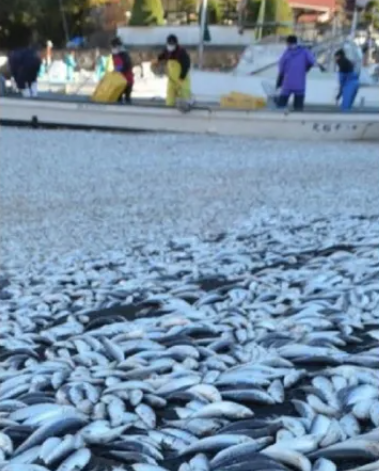
| 双语新闻 Bilingual News | 双语对照阅读 分级系列阅读 智能辅助阅读 在线英语学习 |

| 双语新闻 Bilingual News | 双语对照阅读 分级系列阅读 智能辅助阅读 在线英语学习 |
| [英文] [中文] [双语对照] [双语交替] [] |

| Officials in Japan have admitted they are struggling to determine why hundreds of tonnes of fish have washed ashore in recent days. |
| Earlier this month, an estimated 1,200 tonnes of sardines and mackerel were found floating on the surface of the sea off the fishing port of Hakodate in Hokkaido, forming a silver blanket stretching for more than a kilometer. |
| On Wednesday, officials in Nakiri, a town on the Pacific coast hundreds of miles south of Hokkaido, were confronted with 30 to 40 tonnes of Japanese scaled sardines, or sappa, which had been observed in the area a couple of days earlier. |
 |
| Local fishers scrambled to collect the fish, fearing their carcasses would lower the oxygen content of the water as they decompose and damage the marine environment. |
| “I’ve never seen anything like this before,” a fisher who has worked in the area for 25 years told the Mainichi Shimbun. “It was only around last year that we began to catch sappa in Nakiri. It makes me wonder if the marine ecosystem is changing.” |
| “The cause is unknown at the moment,” Mikine Fujiwara, a local fisheries official, told the newspaper. “We plan to sample the seawater at the site and examine it to uncover the cause.” |
| “There have been no abnormalities found in the results of water-monitoring surveys,” the fisheries agency said, referring to the water that has been pumped out of the Fukushima plant so far. “We’re concerned about the proliferation of information that’s not based on scientific evidence.” |
| Fishing cooperatives in Fukushima had warned that the discharge would inflict further damage on the reputation of their seafood. |
| Town officials in Hakodate urged local people not to consume the stranded fish amid reports that some were gathering quantities to sell or eat. “We don’t know for sure under what circumstances these fish were washed up, so I don’t recommend eating them,” Takashi Fujioka, a fisheries researcher said. |
OK阅读网 版权所有(C)2017 | 联系我们